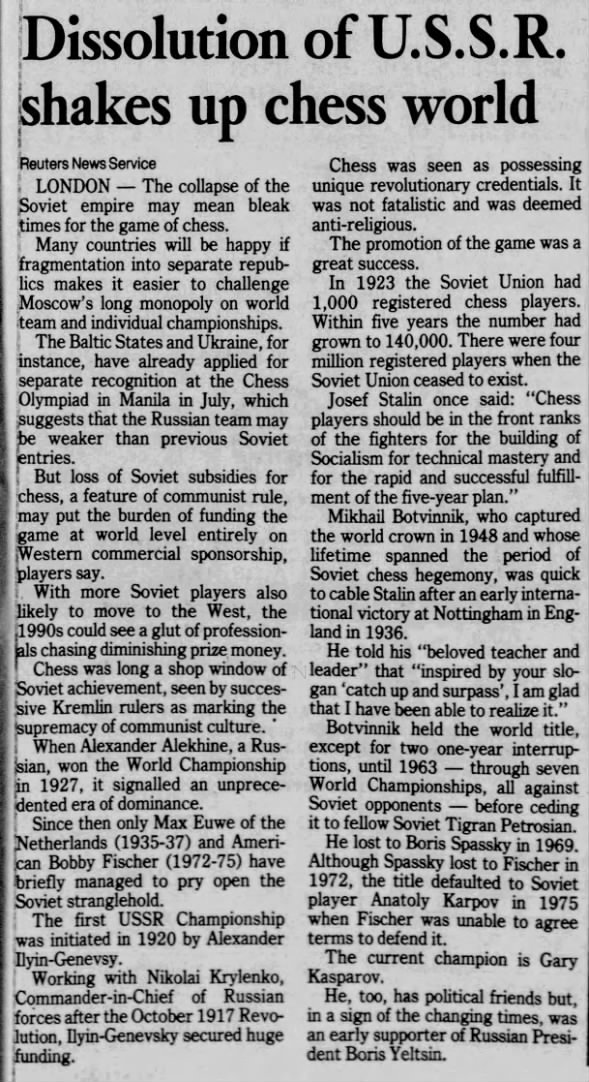The Miami Herald Miami, Florida Sunday, January 12, 1992 - Page 265
Dissolution of U.S.S.R. Shakes Up Chess World
Reuters News Service, London—The collapse of the Soviet empire may mean bleak times for the game of chess.
Many countries will be happy if fragmentation into separate republics makes it easier to challenge Moscow's long monopoly on world team and individual championships.
The Baltic States and Ukraine, for instance, have already applied for separate recognition at the Chess Olympiad in Manila in July, which suggests that the Russian team may be weaker than previous Soviet entries.
But loss of Soviet subsidies for chess, a feature of communist rule, may put the burden of funding the game at world level entirely on Western commercial sponsorship, players say.
With more Soviet players also likely to move to the West, the 1990s could see a glut of professionals chasing diminishing prize money.
Chess was long a shop window of Soviet achievement, seen by successive Kremlin rulers as marking the supremacy of communist culture ([the Nazis, or “National Socialists” used the sports arena as a vehicle to promote political propaganda; i.e., 1936 Berlin Olympics, in an attempt to prove the myth of Racial Superiority and promote Nazi political ideology]).
When Alexander Alekhine, a Russian, won the World Championship in 1927, it signalled an unprecedented era of dominance.
Since then only Max Euwe of the Netherlands (1935-37) and American Bobby Fischer (1972-75) have briefly managed to pry open the Soviet stranglehold.
The first USSR Championship was initiated in 1920 by Alexander Ilyin-Genevsy.
Working with Nikolai Krylenko, Commander-in-Chief of Russian forces after the October 1917 ([Undemocratic, not democratically elected, Soviet Bolshevik Coup, which is not the same thing as the Russian peasant revolt against the Imperialist Tsar, which began February-March 1917 establishing a legitimately democratic election of a Provisional Government for the Russian people “...established a liberal program of rights such as freedom of speech, equality before the law, and the right of unions to organize and strike. They opposed violent social revolution.”. The Bolsheviks, documented Imperial spies Vladimir Lenin, Leon Trotsky, Josef Stalin, on the contrary, destroyed the provisional government established by the people! See https://www.history.com/topics/russia/russian-revolution The Bolsheviks were not the “good guys” and led to the liquidation of millions of Socialists.]), Ilyin-Genevsky secured huge funding.
Chess was seen as possessing unique revolutionary credentials. It was not fatalistic and was deemed anti-religious. ([and also a great reflection of the corporate powers behind employment of the spies Lenin and Trotsky, to carry out politics like a “giant chess board of world politics” for the next century.])
The promotion of the game was a great success.
In 1923 the Soviet Union had 1,000 registered chess players. Within five years the number had grown to 140,000. There were four million registered players when the Soviet Union ceased to exist.
Josef Stalin once said: “Chess players should be in the front ranks of the fighters for the building of ([Bolshevik]) Socialism for technical mastery and for the rapid and successful fulfillment of the five-year plan.”
Mikhail Botvinnik, who captured the world crown in 1948 and whose lifetime spanned the period of Soviet chess hegemony, was quick to cable Stalin after an early international victory at Nottingham in England in 1936.
He told his “beloved teacher and leader” that “inspired by your slogan ‘catch up and surpass’, I am glad that I have been able to realize it.”
Botvinnik held the world title, except for two one-year interruptions, until 1963—through seven World Championships, all against Soviet opponents—before ceding it to fellow Soviet Tigran Petrosian.
He lost to Boris Spassky in 1969. Although Spassky lost to Fischer in 1972, the title defaulted to Soviet player Anatoly Karpov in 1975 when Fischer was unable to agree terms to defend it.
The current champion is Gary Kasparov.
He, too, has political friends but, in a sign of the changing times, was an early supporter of Russian President Boris Yeltsin.
 Dissolution of U.S.S.R. Shakes Up Chess World 12 Jan 1992, Sun The Miami Herald (Miami, Florida) Newspapers.com
Dissolution of U.S.S.R. Shakes Up Chess World 12 Jan 1992, Sun The Miami Herald (Miami, Florida) Newspapers.com






















